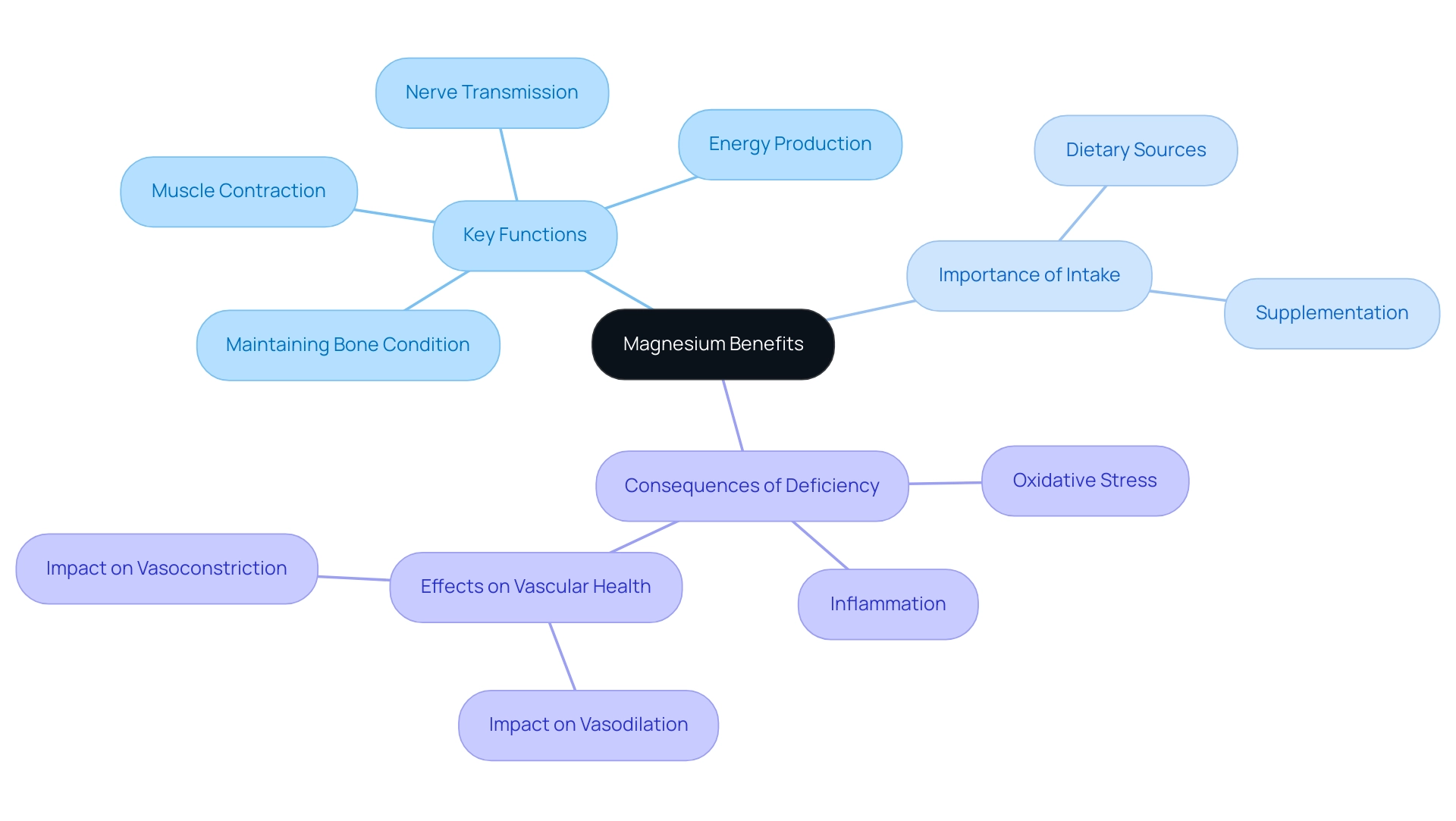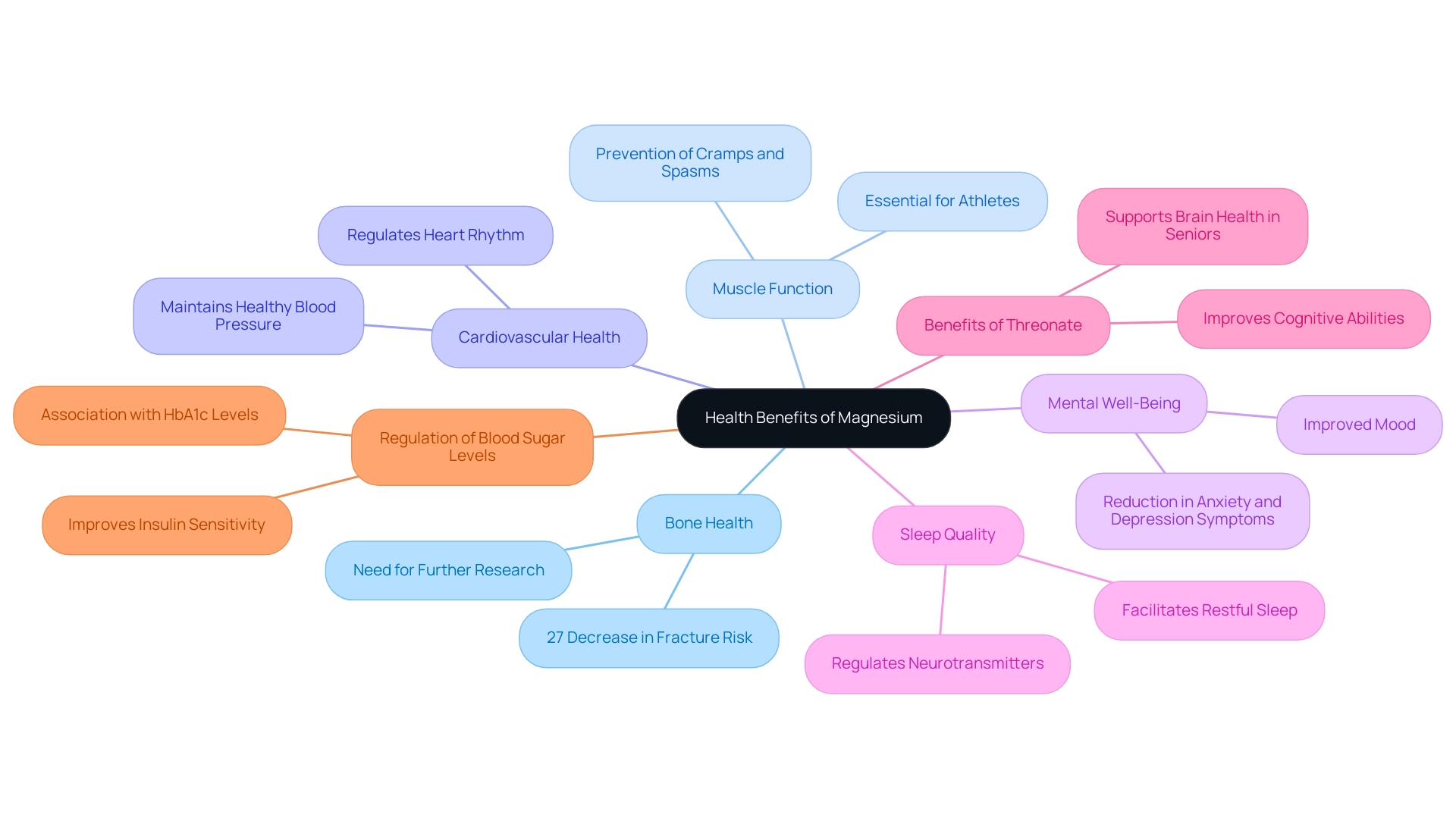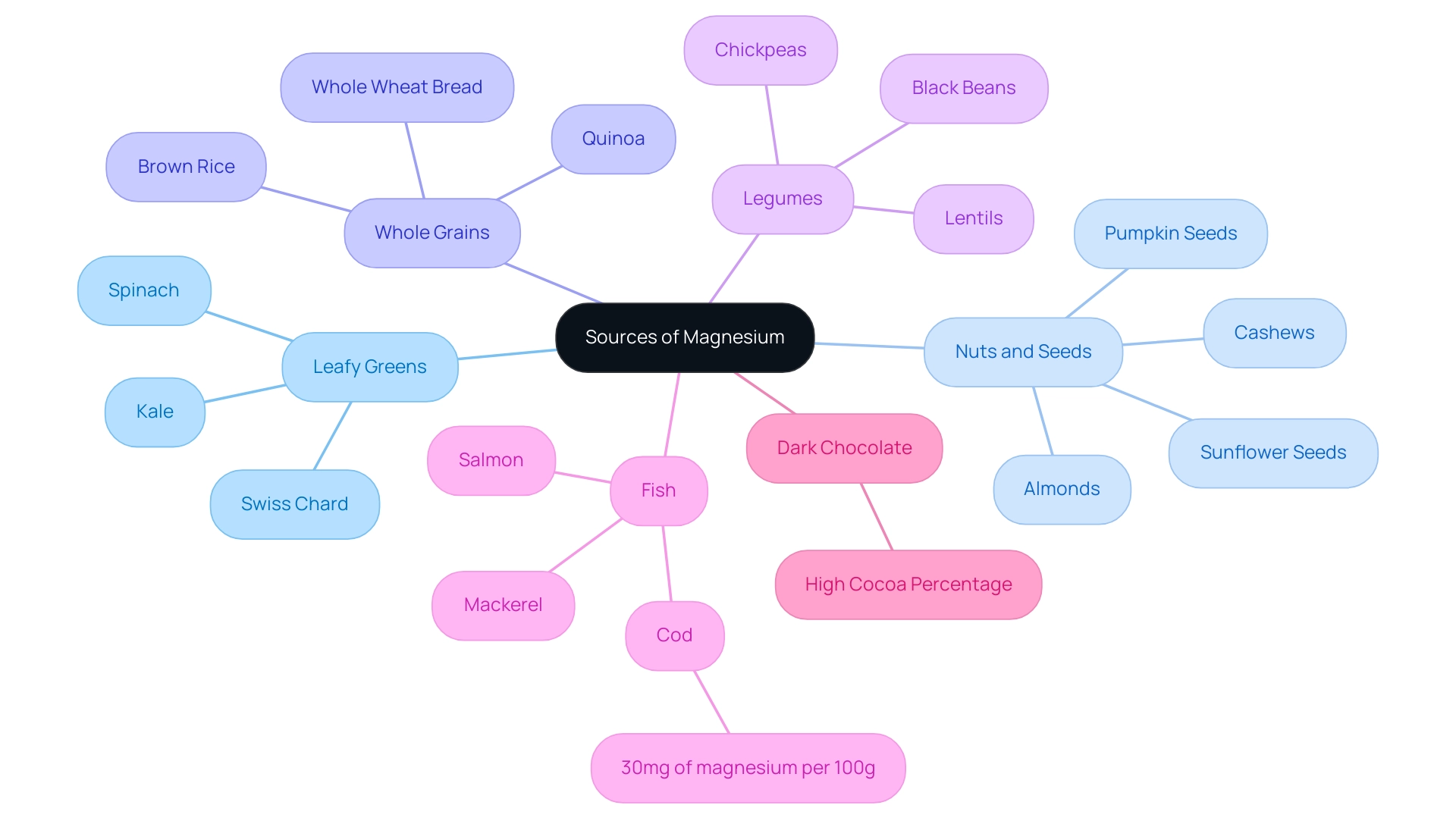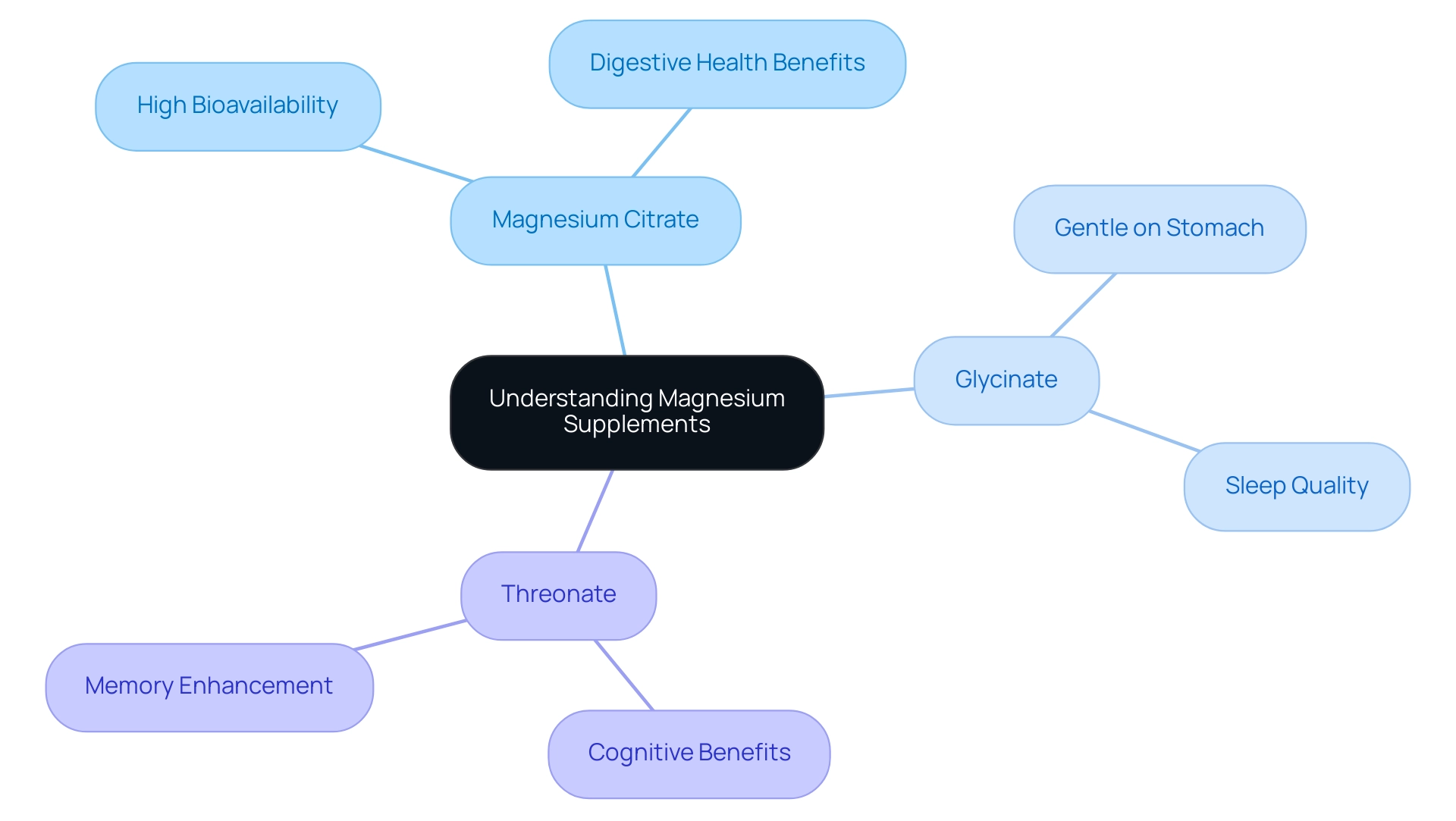Introduction
Magnesium is not just another mineral; it is a cornerstone of human health, influencing a multitude of bodily functions that are essential for overall well-being. From supporting muscle and nerve function to playing a critical role in energy production and bone health, magnesium's importance cannot be overstated.
As research continues to unveil the implications of magnesium deficiency, it becomes increasingly clear that maintaining adequate levels of this mineral is vital for preventing chronic health issues, particularly those related to cardiovascular and metabolic disorders.
This article delves into the multifaceted benefits of magnesium, explores dietary sources, and discusses the role of supplements in achieving optimal health, providing a comprehensive overview of why this essential nutrient deserves attention in any health-conscious inpidual's regimen.
1. Understanding Magnesium: Essential Role in Health
The magnesium benefits include its crucial role in various bodily functions, such as:
- Muscle contraction
- Nerve transmission
- Energy production
- Maintaining bone condition
As an essential nutrient, magnesium benefits the body by participating in over 300 enzymatic reactions, which facilitate critical biochemical processes necessary for optimal physiological functioning. Many investigations conducted in the last 30 years have demonstrated that prolonged lack of this mineral is linked to and worsens significant medical issues, especially cardiovascular and metabolic conditions.
This emphasizes the necessity for adequate intake of the mineral, as the magnesium benefits can be obtained through both dietary sources and supplementation. The consequences of a lack of this mineral extend beyond personal well-being, leading to oxidative stress and inflammation, particularly in vascular cells, ultimately undermining endothelial condition and function. For example, a case study on vascular functioning demonstrates that this mineral is vital for vascular well-being, affecting vasodilation and vasoconstriction, and its deficiency can result in harmful effects on blood circulation.
Considering the latest research and statistics indicating a growing prevalence of magnesium deficiency, it is essential to acknowledge the magnesium benefits for sustaining well-being and preventing disease.

2. Exploring the Health Benefits of Magnesium
Magnesium is a crucial mineral that provides a wide range of health benefits, including the following:
-
Bone Health: Magnesium plays a vital role in maintaining bone density and strength, working synergistically with calcium and vitamin D to support skeletal integrity. Significantly, women who meet the recommended nutrient allowance for this mineral experience a notable 27% decrease in fracture risk; however, it is essential to observe that total intake of this element, when assessed as a continuous variable, did not reveal a direct connection to reduced fracture risk. This emphasizes the necessity for additional investigation into the particular functions of this mineral in bone well-being, as recognized in recent research that mentions constraints such as dependence on self-reported food consumption and the lack of bone mineral density evaluations. As Antonella Riva states, "Understanding the precise contributions of this mineral to bone health is essential, especially considering the complexities involved in dietary assessments."
-
Muscle Function: This mineral is essential for muscle contraction and relaxation. The magnesium benefits include preventing cramps and spasms, making it essential for athletes and active inpiduals aiming to enhance their physical performance.
-
Cardiovascular Health: Magnesium is instrumental in regulating heart rhythm and maintaining healthy blood pressure levels. Evidence suggests that adequate intake of this mineral is linked to magnesium benefits, including a reduced risk of cardiovascular diseases, reinforcing its significance in overall heart health.
-
Mental Well-Being: Research indicates a positive correlation between mineral levels, including magnesium benefits, and mental well-being. Adequate intake of this mineral provides magnesium benefits that are linked to improved mood and a reduction in symptoms associated with anxiety and depression.
-
Sleep Quality: This mineral contributes to better sleep quality by regulating neurotransmitters that calm the nervous system, thereby facilitating a restful night’s sleep.
-
Benefits of Threonate: This specific type of mineral has shown promise in improving cognitive abilities and memory, particularly in senior inpiduals. Its unique properties make it a promising supplement for supporting brain health.
-
Regulation of Blood Sugar Levels: Magnesium improves insulin sensitivity, playing a critical role in managing blood sugar levels and potentially preventing type 2 diabetes. A recent study revealed a positive association between genetically determined serum mineral levels and HbA1c, underscoring its relevance in diabetes management (beta-estimate: 0.572, p < 0.0001).
In summary, the perse magnesium benefits highlight the significance of this mineral in enhancing overall wellness.

3. Sources of Magnesium
This mineral is present in a variety of foods that play a crucial role in nutritional consumption. Key sources include:
- Leafy Greens: Vegetables such as spinach, kale, and swiss chard are not only rich in magnesium but also packed with essential vitamins and minerals.
- Nuts and Seeds: Almonds, cashews, pumpkin seeds, and sunflower seeds are notable for their high magnesium content, highlighting the magnesium benefits of these healthy snack options.
- Whole grains: Quinoa, brown rice, and whole wheat bread are excellent choices that provide considerable magnesium benefits along with fiber.
- Legumes: Black beans, lentils, and chickpeas provide magnesium benefits along with protein and various other nutrients.
- Fish: Fatty fish varieties, including salmon, mackerel, and cod—containing 30mg of magnesium per 100g—contribute to magnesium intake and highlight magnesium benefits while providing omega-3 fatty acids beneficial for cardiovascular wellness.
- Dark Chocolate: High-quality dark chocolate, particularly those with a high cocoa percentage, is both a delicious treat and a source of magnesium benefits.
Incorporating a perse array of these foods into your meals can help ensure adequate intake of this mineral, which offers significant magnesium benefits crucial for overall well-being. As noted by health expert Deborah Weatherspoon, the magnesium benefits are significant in relation to diabetes, underscoring the mineral's importance in managing various health conditions. Furthermore, the mineral content in foods such as edamame—where a half-cup holds 50 milligrams, or 12% of the daily value—shows the potential for low-calorie snacks to support nutritional requirements.
It is important to note that while these supplements are commonly used for leg and foot cramps, evidence does not support their effectiveness for this purpose according to a Cochrane review of randomized controlled trials. Care should be taken, however, as excessive intake from non-food sources can lead to adverse effects, with diarrhea being the most common sign of toxicity. Comprehending these nutritional sources is essential for sustaining optimal levels of minerals and understanding the magnesium benefits for promoting overall well-being.

4. Magnesium Supplements: When and How to Use Them
For inpiduals who find it challenging to meet their mineral requirements through dietary sources alone, supplementation serves as a practical alternative. Prior to initiating any supplement regimen, it is crucial to consult a healthcare provider to ensure safe and appropriate use. The worldwide vitamins and supplements industry, assessed at $1.91 billion in 2019, is expected to expand to $2.84 billion by 2024, with a CAGR of 5.79%, emphasizing the growing significance of mineral supplementation in well-being.
Several forms of magnesium supplements are available, each offering distinct advantages:
- Magnesium Citrate: Renowned for its high bioavailability, this form is particularly beneficial for those experiencing digestive issues as it facilitates better absorption. A case study highlighted its effectiveness in improving digestive health among patients with gastrointestinal disorders.
- Glycinate: This gentle option is less likely to induce gastrointestinal discomfort, making it an ideal choice for inpiduals seeking relaxation and improved sleep quality.
- Threonate: Noteworthy for its potential cognitive benefits, this variant may enhance memory function, appealing to those focused on mental acuity.
Healthcare specialist Nils-Gerrit Wunsch highlights, "The magnesium benefits of supplementation can be crucial in attaining optimal well-being, especially since nutritional sources may not be adequate for all.
When determining the appropriate dosage, it is advisable to adhere to the instructions provided on the supplement packaging or consult a healthcare professional. This ensures that inpidual needs and dietary intake are considered, promoting optimal health outcomes.

Conclusion
Magnesium is undeniably a cornerstone of human health, influencing various physiological functions critical to overall well-being. As outlined, this essential mineral supports:
- Muscle and nerve function
- Energy production
- Bone health
The prevalence of magnesium deficiency highlights the urgency of ensuring adequate intake through diet or supplementation to mitigate the risk of chronic health issues, particularly cardiovascular and metabolic disorders.
The multifaceted benefits of magnesium extend beyond basic health; it contributes to:
- Bone density
- Muscle function
- Cardiovascular health
- Mental well-being
- Sleep quality
- Blood sugar regulation
Incorporating magnesium-rich foods such as leafy greens, nuts, seeds, whole grains, legumes, fatty fish, and dark chocolate can significantly enhance dietary intake. For those who struggle to meet their magnesium needs through food alone, various supplements are available, each with unique advantages tailored to inpidual health goals.
In conclusion, recognizing magnesium's vital role in health is essential for anyone aiming to enhance their overall well-being. Prioritizing magnesium intake, whether through a well-balanced diet or appropriate supplementation, is crucial to preventing deficiencies and promoting long-term health benefits. As research continues to shed light on this mineral's significance, inpiduals are encouraged to take proactive steps towards optimizing their magnesium levels for a healthier future.


































